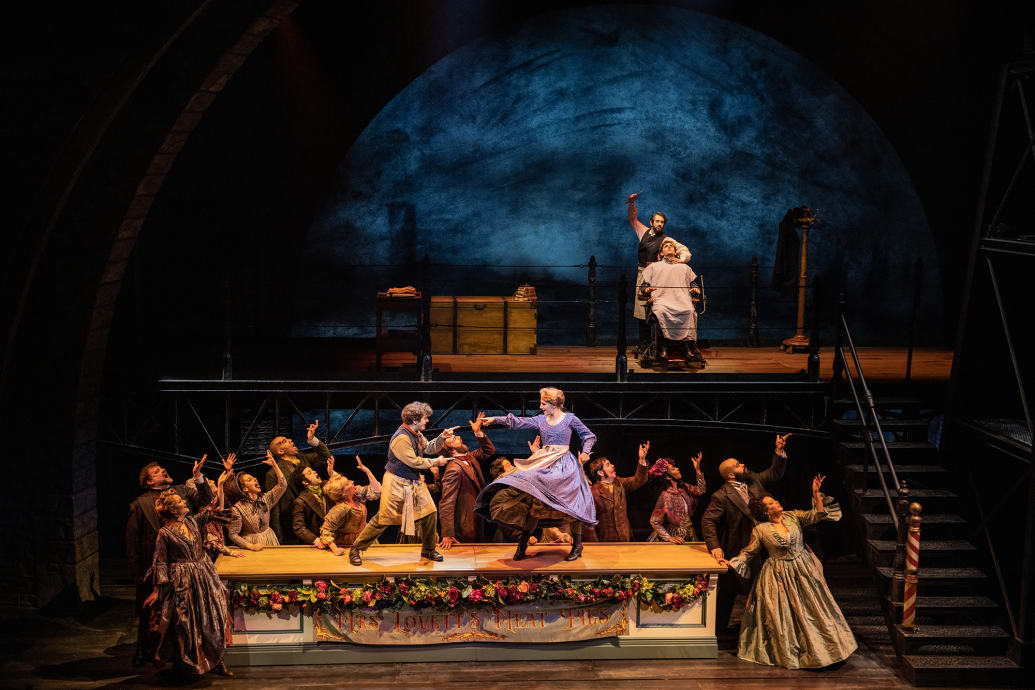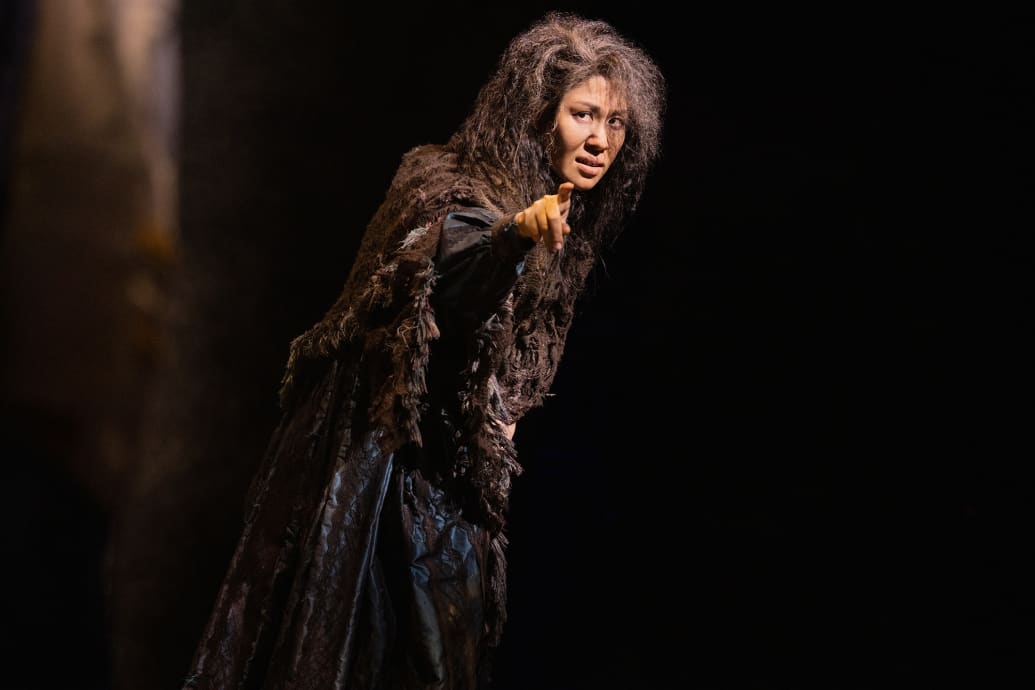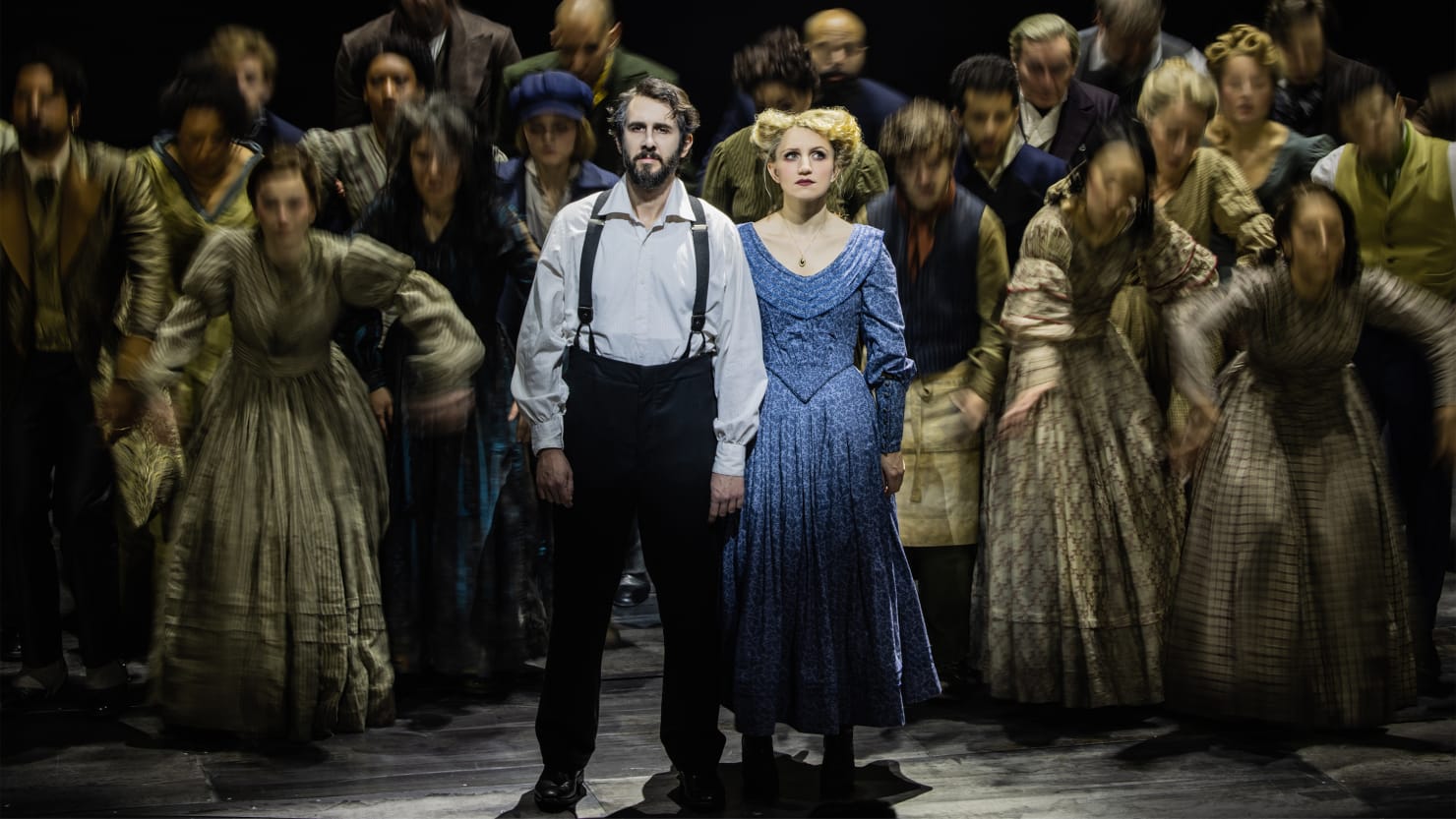Up until about 10.45pm on Thursday evening, this critic thought he had seen the best coup de théâtre of this Broadway season at the end of A Doll’s House starring Jessica Chastain, in which her Nora walks out of her home and… well, it will still go unrevealed here in case any readers have bought a ticket. But then came the last thrilling moment of the zipping, glorious revival of Stephen Sondheim’s Sweeney Todd: The Demon Barber of Fleet Street (Lunt-Fontanne Theatre, booking to Jan 14, 2024)—and, sorry A Doll’s House, you have been aced.
It is not just a visual feat in that last second. A tangibly delighted audience was ready to applaud. The final exits from the stage were in process, the last crescendo of notes reached. And then, bam, the ecstatic response of the audience anticipating their cue to stand suddenly gained the cherry on top of a gasp of collective shock. In that closing moment—like much of the show, thrilling and arch all at once—an exquisite production outdid itself. (Expect a Sondheim vs. Sondheim situation at this year’s Tony Awards, with this production likely up against Into the Woods for Best Revival; Sweeney Todd the third lovely Sondheim revival in New York following Merrily We Roll Along off-Broadway.)
This Sweeney is an intricate, witty piece of storytelling— from an adaptation by Christopher Bond and book by Hugh Wheeler—with gorgeously frisson-filled orchestrations by Jonathan Tunick. The show, directed with imaginative brio by Thomas Kail, is not fault-free (mostly to do with its deficiencies in its lack of sound and amplification, and its design), but those faults are not fundamentally undermining.
The chorus of dancers and singers guide us through the story from the beginning, both gossipy and—as their Thriller zombie-like swaying from side to side shows—horrified, scared, and traumatized (the whirlingly spirited choreography is by Steven Hoggett).
This entire review could be a drooling recitation of Sondheim’s genius with lyrics, but there it is right at the start with the chorus singing at their theatrical gallop, “He kept a shop in London Town, Of fancy clients and good renown. And what if none of their souls were saved? They went to their graves impeccably shaved,” through to their campily wide-eyed staccato repeats of “the demon barber of Fleet Street!”
The excellent Josh Groban plays Todd with a bubbling fury and impatience, as well as a simmering outrage and insanity, returning to London, “the hole in the world…the great black pit” inhabited by “the vermin of the world” to get his revenge on Judge Turpin (a suitably unctuous and malign Jamie Jackson) whose machinations led to both his exile and breakdown of his marriage. His serial killing spree extends to all men he sees embodying all that is wrong in the world. As he sings, furiously, “Not one man, no, nor ten men, nor a hundred, can assuage me.”

Gaten Matarazzo, Annaleigh Ashford, Josh Groban, Nathan Salstone and the company of Sweeney Todd.
Matthew Murphy and Evan Zimmerman
Opposite Groban is a seriously Tony-contending, barnstorming performance by Annaleigh Ashford as pie shop owner Mrs. Lovett, her comedy of gleeful carelessness curdling to fatal obsession. She is punky, off-kilter, kind of feral—quiet, then booming.
We know hers is the perfect place for Todd to set up his barbershop killing machine in because, as Ashford sings in her Mrs. Lovett’s first song, she is already responsible for “The Worst Pies in London,” plucking bits of goodness knows what from the pastry, mini-clouds of dust-meets-flour puffing forth, proud of her terrible reputation of giving “stomach cramps to half the neighborhood” as Ruthie Ann Miles’ character of the Beggar Woman puts it.
Mrs. Lovett wonders if a competitor is putting cats in her pies, then adds blithely that those pussy cats are “quick.” Her own pies? Well, they’re greasy and gritty and taste of—Ashford deploys the perfect pause here—“pity.”
The two are perfectly mismatched, a forced union of conflicting needs that can only lead to disaster. When Groban holds his barber blades up, he tells us they are his friends, and they do indeed “glisten” as they catch the light. Together they will do “wonders.” As he sings that, Mrs. Lovett sings a counter-verse of love and connection for him, revealing that while allies they want such different things. She imagines real jewels, while he imagines the rubies of blood dripping from necks.
Together, Groban’s Todd and Ashford’s Mrs. Lovett are seductively comedic, tragic, and desperate—he slitting throats upstairs and then dispatching bodies down a Willy Wonka-ish chute into the fiery furnace for Mrs. Lovett to somehow expertly de-sinew and butcher into pies. If Todd seems lost in his madness but in outward control, Mrs. Lovett seems more attached to reality even if she is more lost in her mind. As he sings about killing, she reminds him they have to actually get rid of a body.
“
It’s man devouring man my dear. And who are we to deny it here?
”
Just as much as the musical is about murder, revenge—and always being careful to check the provenance of your food—it is also about the unquenchable furnace of capitalism and venality that London was becoming; the musical positing its residents literally becoming cannibals in service to their desires.
“It’s man devouring man my dear,” Todd says to Mrs. Lovett of the noise of the city. “And who are we to deny it here?” The two make merry as they imagine the different-tasting pies depending on their human constituent, like priests (“Heavenly”), poets, and marines (who always taste of where they’ve been). Soon, London is feasting on these horrors, with Mrs. Lovett bashfully refusing to divulge the secret of the taste: “Family secret, all to do with herbs.”
Ashford’s Cockney accent travels arounds the rest of the British Isles slightly, but no matter. She’s a physical comedy genius, a total, very artful ham, bringing the shole show to a giggling standstill as she slides down the stairs. When Mrs. Lovett sings her song of romantic fantasy, “By the Sea,” Ashford drapes herself over Groban, lost in the vision of an idyllic future life (“with the fishies splashing, wouldn’t that be smashing?”). She literally hangs off him, flapping her arms as a menacing seagull, as he lightly recoils from her until he can no longer bear to be so polite about it. The audience laughs at both her imaginings and manner, but Todd’s rictus curl of lip underlines we should also be scared for her and the cost of her delusion.
In moments, Ashford’s and other voices disappear into the cavernous backdrop of the Lunt-Fontanne stage, and this, while not her fault reveals the show has an acoustic issue. This critic was fortunate to be near the stage, but still felt, especially at the beginning of the show, a lot of sound was either being lost or not being strongly enough conveyed into the theater.
Mimi Lien’s two-tiered design aims to bring to murky life the 19th century tangle of dark streets and smoking chimneys of 19th century London, and we sort of feel the roiling, corruption-streaked city Todd sings of with such disdain, but—beyond the fiery orange of the pie shop furnace—not enough. The staging feels also feels recessive; ingenious in some ways—especially in act two when we realize the full use of the towering stair/oil derrick looking contraption on the right hand side—but also lumbering, looming, and fussy. The characters can feel lost on stage at moments when they should feel central and pronounced. The scenes can feel too arranged rather than seamlessly flowing.
Is the sound being swallowed back there, or being lost in the space between stage and audience? Whatever, if a character is talking softly, the audience is struggling to hear them. Natasha Katz’s lighting is luminously beautiful; shafts of white light pierce the gloam from above and the sides, as if psychologically lighting the charnel house meets netherworld and gateway to hell that Mrs. Lovett’s pie shop becomes. Primary colors flush the constant outline of the moon at the back of the stage, and the characters as they prowl and ponder. Emilio Sosa’s costumes are period-perfect.

Ruthie Ann Miles in the production of Sweeney Todd.
Matthew Murphy and Evan Zimmerman
Subsidiary characters are so well sung and imagined they hardly feel hardly subsidiary. Miles as the tangle-haired, barely comprehensible Beggar Woman has one of the toughest roles—a much more significant character than her name implies, she is also a one-woman Greek chorus of all that unfolds, who expresses the terror of all she sees all around her with cries of “City on fire!”, again pairing the horror of what is occurring inside Mrs. Lovett’s pie shop with the ravenously capitalist city around it. Maria Bilbao as Johanna, Todd’s secret daughter, is Turpin’s both ward and creepily intended bride, has both a sweetness and a spiky impatience about her imprisonment.
Jordan Fisher as Anthony plays his love for Johanna, and determination to rescue her, stoutly straight—and sings his love song, “Johanna” with a bring-the-house-down ardor. Reunited at one point they sing over each other, she imagining him killed, in a debtors’ jail, or trampled by a horse, he wanting to marry her. Their song, “Kiss Me,” has a springy sense of fun to it, considering the desperate circumstances Johanna is in, Sondheim ingeniously threading in the converse plans of Turpin and his sidekick Beadle Bamford (John Rapson) through the lyrics.
The high-jinks and mugging of Pirelli (Nicholas Christopher), Todd’s barber competition and first victim, as they face off to prove who can de-whisker customers best, is another act one delight; Todd taking one look at Pirelli’s hair elixir and declaring it “piss—with ink.”
As Pirelli’s assistant, Tobias, Stranger Things’ Gaten Matarazzo has a vulnerability and fatal inquisitiveness as he wonders what happened to his boss, and what really happens in the depths of the pie shop. He and Ashford give that famously tender aria, “Not While I’m Around,” a quietly bruised intensity (even though it too feels slightly lost in how it is staged on the far left of the stage)—a meeting of not-parent and not-child promising to protect one another, which Mrs. Lovett will soon betray both for herself and her obsession with Todd. The musical proposes a new model for what families and bonds may look like, then tears them apart, because—no spoilers—right in front of us is a biological family that should be together but is broken asunder.
That unit is further broken by the mounting murders and tragedies on stage, and the city careening out of control, with “rats in the streets and lunatics yelling at the moon” as the chorus sings. Groban and Ashford’s final scene together is the perfect bookend to the madness of Todd and Mrs. Lovett’s relationship, she deluded to the end—he, wanting to exact a final revenge for being cheated of all that he could have had and was right in front of him. The chorus has the final fevered say of what has unfolded, but it is the masterful Groban and Ashford—heading to the back of the stage in near-darkness until… well, you’ll see—who command our attention and rapturous applause to the last.
This post originally appeared on and written by:
Tim Teeman
The Daily Beast 2023-03-27 01:04:00

